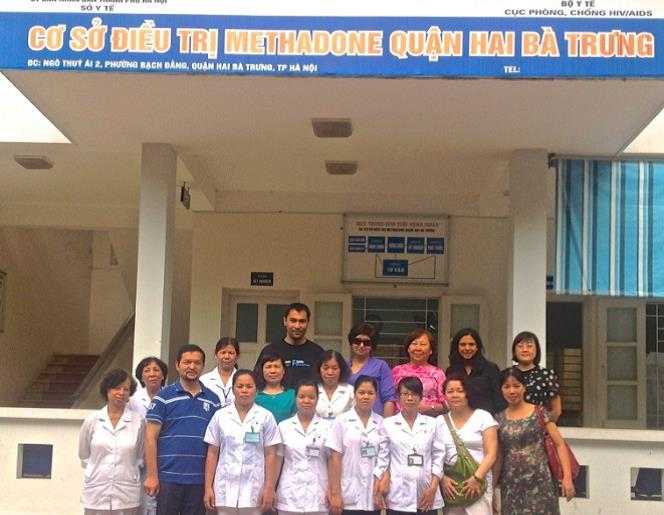CDC Vietnam shares HIV/AIDS expertise with Central Asia Region

CAR team visits methadone clinic in Hanoi.
For more than 10 years, CDC-Vietnam through PEPFAR has been providing scientific and technical expertise to the Government of Vietnam in their fight against HIV/AIDS. Last summer, technical experts from CDC-Vietnam shared their successes and lessons learned with CDC’s Central Asia Region office (CAR), an exemplary global health model of using science-driven action and partnerships to maximize public health impact. CDC-Vietnam hosted a delegation of CDC technical experts and government officials from Tajikistan, Kazakhstan, and Kyrgyzstan last August to discuss how the PEPFAR response in Vietnam has been effective in providing high quality HIV/AIDS prevention services to key populations.
Different landscapes, similar challenges
Although vastly different in geographic and cultural landscape, Vietnam and the Central Asia Region share similar challenges in addressing the HIV/AIDS epidemic in their respective countries. “Upon returning from a technical assistance visit to the CDC-CAR program to assist in key population strategic planning, we immediately arranged for the CAR team to visit us in Vietnam…because the similarities in technical strategy and political context are strong, and ‘better’ practices can readily be applied in both regions,” said Nisha Gupta, Branch Chief of HIV Prevention for CDC-Vietnam.
Site visits enhance understanding
During their visit to Vietnam, the CDC-CAR delegation saw first-hand how CDC-Vietnam works with the Vietnam Ministry of Health and other key ministries to implement innovative strategies to recruit key populations to HIV/AIDS prevention and treatment services and provide referrals and linkages to care. For example, in Hanoi and Ho Chi Minh City, the delegation met with community leaders and clients to understand the various evidence-based prevention strategies used for people who inject drugs, including models to increase HIV voluntary counseling and testing and medication-assisted therapy uptake, and leverage needle and syringe programs supported through other donors. They also learned about effective monitoring and evaluation methodologies and successful approaches to working with the Vietnamese government and partners.
“I liked the integrated program sites I visited in Districts 4 and 8 of Ho Chi Minh City. This integrated model provides services for people who inject drugs all in one place, hence increasing retention to care. I will apply this integrated approach in Tajikistan and advocate with the Ministry of Health to replicate this model in other locations with key populations,” said Alijon Soliev, Head of Monitoring and Evaluation Department of the National AIDS center in Tajikistan.
No matter where the HIV/AIDS epidemic, the exchange of best practices using cutting-edge strategies and evidence-based models of HIV prevention and care can be a high impact and cost-effective way to fight the HIV/AIDS epidemic globally.
- Page last reviewed: March 7, 2016
- Page last updated: March 7, 2016
- Content source:
Global Health
Notice: Linking to a non-federal site does not constitute an endorsement by HHS, CDC or any of its employees of the sponsors or the information and products presented on the site.


 ShareCompartir
ShareCompartir